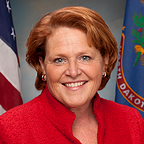What I learned on my two-day, statewide Farm Bill tour
When I was growing up in small town North Dakota, I knew that my family and my community relied on agriculture even though we didn’t live on a farm. If farmers didn’t succeed, our community didn’t succeed.
Farmers are the lifeblood of North Dakota’s economy to this day, and in the U.S. Senate I helped write, negotiate, and pass a robust 2014 Farm Bill to protect farmers while keeping rural America strong.
The 2014 Farm Bill doesn’t expire until September 30, 2018, but it’s already time to start planning for the next one. To prepare, I got out in the field last week — traveling from Mandan to Cleveland to Buxton — meeting with North Dakota farmers and agricultural leaders about our state’s top priorities. Over the course of my two-day statewide tour I heard about which provisions I secured in the 2014 Farm Bill are working, and I began to consider what I can do to improve the next Farm Bill.
My tour touched on some of my top priorities in any Farm Bill: providing a strong safety net for producers, promoting research, and expanding exports.
My first stop was the U.S. Department of Agriculture’s Northern Great Plains Research Laboratory in Mandan, where I joined researchers to get out in the field and see what they’re doing to study soil health — from nutrient levels to wind erosion to crop rotation.
Promoting research to make agriculture more efficient and profitable is one of my top priorities, and I push for it every year. Smart investments in research strengthen rural communities, and help North Dakota researchers and research universities lead our country in innovation.
Next I headed to a farm near Cleveland, N.D., where Denny Ova drove me out into some wetlands on his farm that are enrolled in a program to encourage farmers to voluntarily preserve wetlands. Folks from Delta Waterfowl, a nonprofit that supports habitat conservation, explained how this pilot project provides incentives for farmers not to drain wetlands while allowing them to continue to farm the land.
I’ve long pushed to guarantee conservation compliance requirements don’t hurt producers, and successfully removed the most harmful provisions tying conservation compliance to crop insurance in the 2014 Farm Bill. As I lay the groundwork for the 2018 Farm Bill, I’m looking at whether something similar to this Delta Waterfowl program could be included.
From Cleveland, I went to the North Dakota Farmers Union in Jamestown to sit down with local producers and agricultural leaders from North Dakota commodity groups. Our conversation there centered on crop insurance and Title I safety net programs.
The 2014 Farm Bill that I fought to pass strengthened crop insurance — a key component of the farm safety net — while providing five years of certainty for farmers. Since then, I’ve worked to protect crop insurance and make sure the Farm Bill is implemented properly.
The next day, I headed up to Central Valley Bean Coop in Buxton to reinforce how critical it is to have strong export promotion tools in the Farm Bill. Export promotion and market development programs encourage countries around the globe to buy our high quality agricultural products, while providing technical assistance to guarantee countries use our products over our competitors’.
Studies from Texas A&M and Cornell University economists since 2002 have shown that for every $1 invested in these programs, there’s a return ranging from $24 to $35. For dry beans, that return is even higher.
At the coop, I spoke with bean growers about maintaining and possibly expanding those export promotion programs in the 2018 Farm Bill, while also highlighting my efforts to expand U.S. agricultural exports to Cuba, which has a high demand for beans and other North Dakota crops.
From Buxton, I headed to the Levos family’s farm near Chaffee to meet with sugar growers, younger farmers, and leaders from American Crystal Sugar.
It was great to sit down with North Dakota farmers to talk about my efforts to defend the sugar program in the 2014 Farm Bill and to make sure we don’t face unfair competition from Mexico. We also spoke about my work to successfully defend crop insurance last fall after a budget deal threatened the integrity of the program.
So what did I learn on my two-day statewide tour?
First, that rural America is strong and resilient — and second, that the Farm Bill I helped write, negotiate, and pass in 2014 has mostly worked well for our state. It may not be perfect, but I’ll keep addressing those imperfections as I working to guarantee a strong bill in 2018.
With North Dakotans’ input from this tour, I’m ready to hit the ground running as Congress heads into negotiations for the 2018 Farm Bill. This was just the beginning of the conversation, and I look forward to continuing it to make sure there’s a strong Farm Bill for North Dakota.
Getting in the field with farmers and agriculture leaders has given me great ideas about what’s worked in the past, and how we can improve the Farm Bill even more to guarantee a strong, thriving rural America for years to come.
